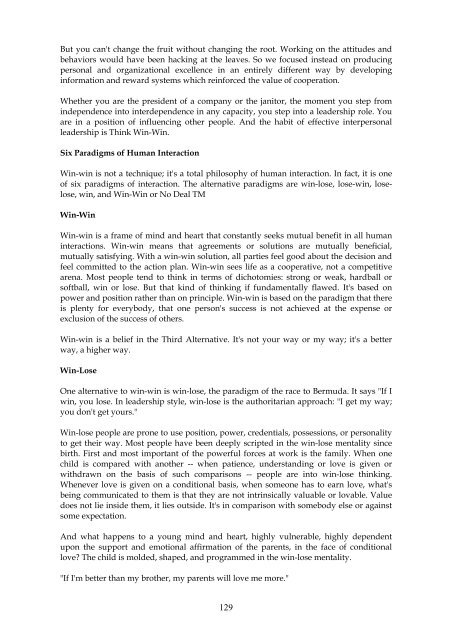Covey - The 7 habits of highly effective people
Create successful ePaper yourself
Turn your PDF publications into a flip-book with our unique Google optimized e-Paper software.
But you can't change the fruit without changing the root. Working on the attitudes and<br />
behaviors would have been hacking at the leaves. So we focused instead on producing<br />
personal and organizational excellence in an entirely different way by developing<br />
information and reward systems which reinforced the value <strong>of</strong> cooperation.<br />
Whether you are the president <strong>of</strong> a company or the janitor, the moment you step from<br />
independence into interdependence in any capacity, you step into a leadership role. You<br />
are in a position <strong>of</strong> influencing other <strong>people</strong>. And the habit <strong>of</strong> <strong>effective</strong> interpersonal<br />
leadership is Think Win-Win.<br />
Six Paradigms <strong>of</strong> Human Interaction<br />
Win-win is not a technique; it's a total philosophy <strong>of</strong> human interaction. In fact, it is one<br />
<strong>of</strong> six paradigms <strong>of</strong> interaction. <strong>The</strong> alternative paradigms are win-lose, lose-win, loselose,<br />
win, and Win-Win or No Deal TM<br />
Win-Win<br />
Win-win is a frame <strong>of</strong> mind and heart that constantly seeks mutual benefit in all human<br />
interactions. Win-win means that agreements or solutions are mutually beneficial,<br />
mutually satisfying. With a win-win solution, all parties feel good about the decision and<br />
feel committed to the action plan. Win-win sees life as a cooperative, not a competitive<br />
arena. Most <strong>people</strong> tend to think in terms <strong>of</strong> dichotomies: strong or weak, hardball or<br />
s<strong>of</strong>tball, win or lose. But that kind <strong>of</strong> thinking if fundamentally flawed. It's based on<br />
power and position rather than on principle. Win-win is based on the paradigm that there<br />
is plenty for everybody, that one person's success is not achieved at the expense or<br />
exclusion <strong>of</strong> the success <strong>of</strong> others.<br />
Win-win is a belief in the Third Alternative. It's not your way or my way; it's a better<br />
way, a higher way.<br />
Win-Lose<br />
One alternative to win-win is win-lose, the paradigm <strong>of</strong> the race to Bermuda. It says "If I<br />
win, you lose. In leadership style, win-lose is the authoritarian approach: "I get my way;<br />
you don't get yours."<br />
Win-lose <strong>people</strong> are prone to use position, power, credentials, possessions, or personality<br />
to get their way. Most <strong>people</strong> have been deeply scripted in the win-lose mentality since<br />
birth. First and most important <strong>of</strong> the powerful forces at work is the family. When one<br />
child is compared with another -- when patience, understanding or love is given or<br />
withdrawn on the basis <strong>of</strong> such comparisons -- <strong>people</strong> are into win-lose thinking.<br />
Whenever love is given on a conditional basis, when someone has to earn love, what's<br />
being communicated to them is that they are not intrinsically valuable or lovable. Value<br />
does not lie inside them, it lies outside. It's in comparison with somebody else or against<br />
some expectation.<br />
And what happens to a young mind and heart, <strong>highly</strong> vulnerable, <strong>highly</strong> dependent<br />
upon the support and emotional affirmation <strong>of</strong> the parents, in the face <strong>of</strong> conditional<br />
love? <strong>The</strong> child is molded, shaped, and programmed in the win-lose mentality.<br />
"If I'm better than my brother, my parents will love me more."<br />
129


